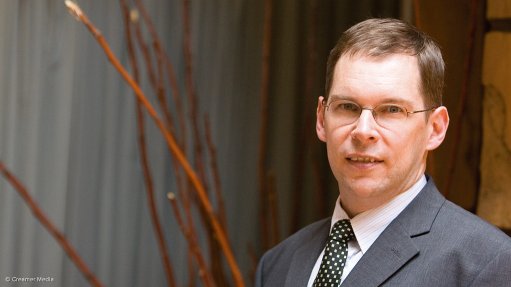
Eskom senior GM Andrew Etzinger
Photo by: Dylan Slater
The Energy Services Companies (Esco) model funding programme remains integral to efforts by energy utility Eskom to promote the retrofitment and replacement of energy-intensive technologies with energy-efficient technology solutions, despite recent funding cuts to the parastatal’s overarching Integrated Demand Management (IDM) programme, Eskom senior GM Andrew Etzinger said on Wednesday.
Addressing the tenth Southern African Energy Efficiency Convention, in Johannesburg, he further encouraged the emergence of smaller Escos, appealing to the larger, more established energy service providers to support the entry of these emerging firms to the market.
“It’s imperative that Eskom participates in the emergence of [smaller] Escos in the country . . . [and] I’ve asked the bigger Escos to help develop the smaller entrants.
“I’m not just talking about outsourcing work, but helping to establish firms that can go through the whole [programme]. We need a more standardised approach from big Escos . . . to give these smaller player a chance. Its’ s a must have,” he noted.
Eskom was, last year, forced to place on hold several elements of its IDM programme, which included a residential mass roll-out of efficient lighting solutions, the standard offer programme, the standard product and performance contracting programmes and the Esco model as a result of budget cuts.
Etzinger noted on Wednesday, however, that the programme still had R1.7-billion of funding available to achieve targeted energy savings of some 975 MW.
“In terms of demand-side management (DSM) and energy efficiency, the bias from Eskom is towards a focus on DSM . . . and our programmes attempt to do that,” he remarked.
Eskom’s revised Esco model funding programme incentivised low-cost, rapidly implementable, energy efficiency projects that supported partnerships between Eskom and businesses that planned to implement these projects.
Escos specialised in specific areas in the commercial, industrial, mining and agricultural sectors where they identified opportunities for reducing electricity consumption at customers' premises and scoping, executing and implementing these projects on behalf of customers.
The utility’s support of energy efficiency projects was aimed at reducing demand for electricity throughout the day, but specifically between 17:00 and 21:00 – the period of peak electricity demand on weekdays evenings.
“This funding programme, therefore, offers consumers an incentive to shift electrical demand from the evening peak period to off-peak periods,” it held.
Applying for funding under the umbrella of the Esco model required potential projects to achieve demand savings greater or equal to 500 kW during the evening peak periods; be implementable within a maximum period of six months; sustain the proposed demand reduction over a period of 36 months; and
be implemented at a single site.
Participation in the programme required Escos to compile and submit a proposal on the business’ behalf, after which Eskom would review the technical and financial merits of the proposal.